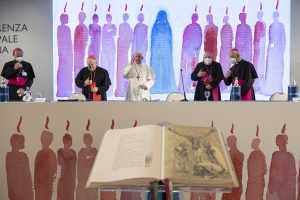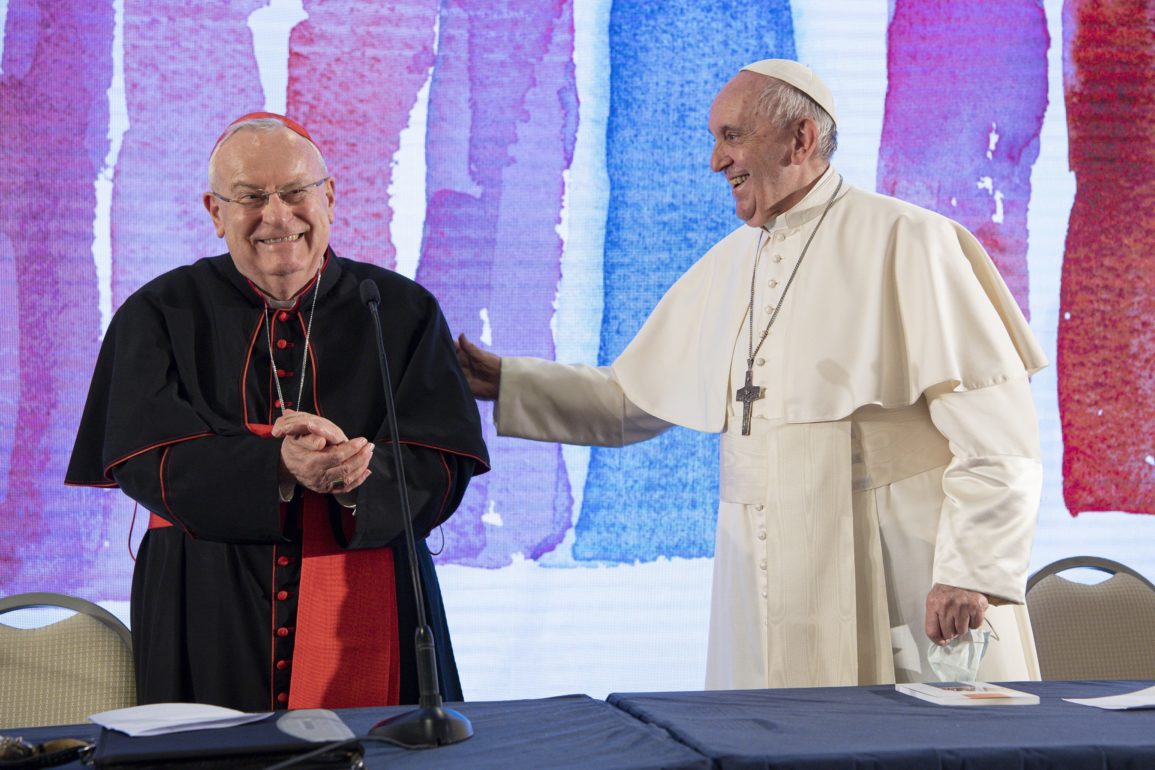The Synodal Path, Ecclesiastical Tribunals and Seminaries were the three subjects Pope Francis indicated for the works of the 74th Assembly of the Italian Episcopal Conference (CEI), opened by the Holy Father’s address.
The opening wasn’t lacking in jokes about the choice of venue for the meeting – the Ergife Palace, a large Roman Hotel noted for being in the past the headquarters of many public competitions. “When I came in, a bad thought came to mind. Sorry, but are we at a Bishops’ assembly or a competition to elect the most handsome Bishop? Because world competitions are held here, but we hope that this assembly will go well ahead. I know it’s not easy to do a domestic thing in a house that isn’t ours, but we can have it become ours with our attitude and prayer.”

The Holy Father was welcome by CEI’s President, Cardinal Gualtiero Bassetti, Archbishop of Perugia; by the Vice-President, Monsignor Mario Meini, Bishop of Fiesole and by Monsignor Franco Giulio Brambilla, Bishop of Novara. Absent, however, was the Bishop of Acireale, Monsignor Antonino Raspanti, suffering from COVID. Also included in the group was CEI’s Secretary General, Monsignor Stefano Russo.
Ecclesiastical Tribunals
In his off-the-cuff address, followed as usual by a closed-door debate with questions and answers, the Pontiff said he was satisfied with the Italian Church’s path in regard to the reform of the Ecclesiastical Tribunals, announcing the visit of two Rotal Judges.
Seminaries
Formation is without a doubt one of the Pope’s great concerns. “There is a very great danger to err in the formation and also in prudence in admitting seminarians,” he warned. “We have often seen seminarians that seemed good but were rigid. And rigidity isn’t of the good Spirit.” And, behind that rigidity, we then realized that there were big problems. Seminarians received without asking information, sent by a Religious Congregation or by a diocese. Beyond receiving them, there is formation. “I believe that regarding concern about priestly formation, the Cardinal President received a letter from the Congregation for the Clergy. We can’t joke with the boys that come to us to enter the Seminary.”
Synodal Path
It was the last argument touched upon by the Pope, but perhaps the one he has most at heart. And he invited all, on one hand, to have this process start from below and, on the other, to rediscover the light of the Florence convention of five years ago. “So many things have happened from the first meeting we had in Saint Peter’s to today.” Here the Holy Father didn’t spare a reproach. “An attitude that we all have, I have witnessed it in the CEI, it happens, it’s amnesia. We lose the memory of what we did. And we go on. And Florence is one of the things whose memory we have lost.”
Then, referring to the Assembly’s title, “To Proclaim the Gospel in a Time of Rebirth – To Start a Synodal Path,” the Pope added: And this was a step forward, at least in the formulation. I would say that the Synod must be carried out under the light of the Florence meeting. This is a patrimony of yours that must enlighten this moment, from the top to the bottom — Florence, and from the bottom to the top the People of God, the smallest parish, the smallest diocesan institution.
The light comes from the Doctrine of the Church, but we say it comes from Florence, from that meeting. However, the Synod must begin from the bottom to the top, from the small communities, from the small parishes and this will call for patience, work, to have the people speak, so that the wisdom of People of God comes out. The Holy Father referred to Lumen Gentium. “A Synod is none other than (. . .) the totality of the People of God — all, from the Bishop gradually down –, which is infallible in believing, that it, it cannot err, when there is harmony in the totality. But that faith must be made explicit.
Cardinal Bassetti’s Greeting
Speaking of the courage that is necessary to undertake the Synod’s path, Cardinal Bassetti quoted Manzoni. Here is the text of his greeting:
Thank you, Holy Father, for coming! Usually, you would receive us joyfully in your home, which we now feel is also ours. Because of the pandemic, however, we have had to change the venue: as you see, our Assembly is renewed in part and especially rejuvenated. We are a numerous family, if not complete because of COVID. At this moment, we huddle together with you, given the grief of all those affected by the tragic incident at the Stresa-Mottarone cable car, assuring our closeness to the little survivor and to the family members of the fourteen victims. Our prayer goes to all of them.
The Fire of Pentecost
The Holy Father, during these days we will reflect on the theme “To Proclaim the Gospel in a Time of Rebirth – To Start a Synodal Path.” The recent Note of the Synod of Bishops comforts and supports us in the process we intend to undertake; a process that starts from below to involve the Holy People of God in our territories, in our Churches. During these days there has often come to mind a phrase of Manzoni in “The Betrothed,” when Father Abbondio in the presence of Cardinal Federigo Borromeo remarks candidly: “If one doesn’t have courage, no one can give it to him.” Instead, we are convinced that if one doesn’t have courage, it might be that it comes to him if he is moved by a desire that is greater than his fears. What is important is to have dreams and desires that are greater than one’s fears. It’s that sacred fire that we received yesterday with Pentecost.
Our synodal path is to walk in tune with that of the Synod of Bishops. It is also an opportunity for our Churches in Italy. In every local Church, in fact, present truly and working is the Church of Christ, One, Holy, Catholic and Apostolic.”










